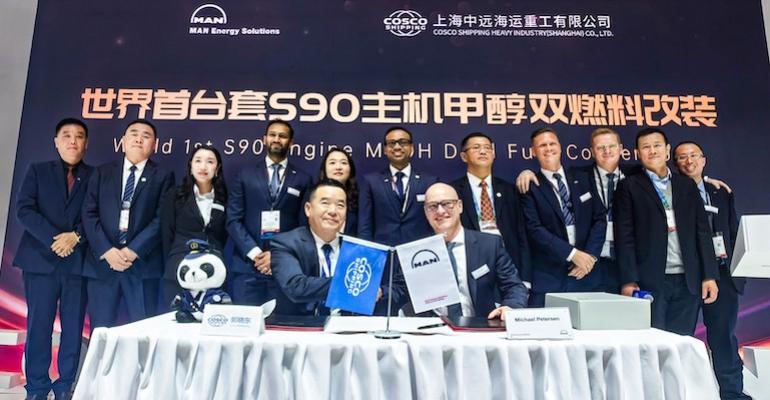The ships under the retrofit deal, which includes an option for nine more ships, will become the first in Cosco’s fleet to use methanol as a fuel.
The four ships in the 13,800 teu Camellia class and the 20,000 teu Virgo class will have their conventional MAN B&W 11S90ME-C10.5 engines retrofitted to methanol dual-fuel MAN B&W 11S90ME-LGIM10.5 units.
The retrofit project will involve MAN providing a package consisting of engineering, parts, project management, technical assistance at the shipyard, sea trial assistance, and recertification of the retrofits. The engine developer has invested in a research and development programme and a testbed to support development of the methanol retrofit technology.
The first container ship is due to undergo the engine retrofit in the second quarter of 2025. From then on, the ships will become the first vessels in service to be fitted with S90-LGIM engines.
The contract follows a recent deal in which Maersk will retrofit G95 engines on board 11 of its container vessels to dual-fuel methanol units. MAN has said that it expects a wave of S90 engine retrofits among the more than 300 ship installations currently in service.
Speaking of the Cosco order, Michael Petersen, MAN Senior Vice President and Head of PrimeServ Denmark, said: “It’s very promising to see one of the largest shipping companies globally choosing MAN Energy Solutions as a partner to attain their decarbonisation goals. We are committed to bringing more retrofit solutions to the market and our investment in the S90-LGIM R&D and testbed programme is a fulfilment of this promise to our customers.
“We are in the early days of a huge wave of dual-fuel retrofits,” he predicted, “and see many concrete projects coming online with the capacity to meet shipping’s demand for green fuels, such as e-methanol and bioLNG. We expect that owners who have opted to wait and watch over the past few years will ultimately also convert their tonnage to dual-fuel.”
In its latest analysis of alternative fuel take-up, classification society DNV revealed that of the 268 ships ordered over the first 11 months of the year, methanol dual-fuelled vessels exceeded those capable of burning LNG by 152 to 112.
Meanwhile, Denmark’s J. Lauritzen has announced that three 81,200dwt Kamsarmax bulk carriers it has ordered at Japan’s Tsuneishi Shipbuilding are to have MAN B&W 7G50ME-C9.6 LGIM dual-fuel methanol engines.
Thought to be among the first bulk carriers capable of running on methanol, the ships have been ordered in cooperation with global food company, Cargill, which will employ the vessels for a minimum period of seven years. The ships will be fully owned by Lauritzen NexGen Shipping which is understood to be the Danish group’s platform for investments in zero-carbon emission ships and future-proof assets.
Copyright © 2024. All rights reserved. Seatrade, a trading name of Informa Markets (UK) Limited.
Add Seatrade Maritime News to your Google News feed.  |

